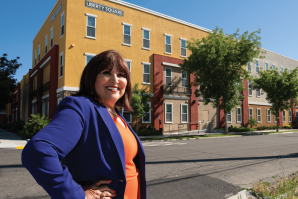When people talk about risk-takers, some images immediately come to mind. Astronauts and skydivers, for example. I’m a risk-taker — I’ve skydived, I’ve climbed Mount Kilimanjaro, I’ve done lots of scuba diving, I’ve started a magazine with $2.50 in my pocket. In the business world, the most courageous are the entrepreneurs. It truly does take courage to open a business and put your name on the door (or the top of a magazine), often armed with little more than an idea and a hope that customers will come and will buy.
Entrepreneurs wear many hats — they order inventory, manage finances, work with customers, do some marketing and more. Often, their larger, corporate-sized competitors have entire departments for each hat a small business owner wears.
There is nothing small about the effect that small businesses have on our region’s economy. By some estimates, businesses run by entrepreneurs account for 60-80 percent of new jobs. In Sacramento alone, 70 percent of the city’s 20,000 businesses have no more than 50 employees. And even beyond those statistics, owners of small businesses play an important social role in our communities, whether they are our neighborhood dry cleaner, restaurant owner, or hardware store providing the services we rely on to get through our everyday lives.
There are many extra risks that go along with being a small business. Inventory can cost more because you can’t buy on a larger scale. You may not have enough staff to cover all the bases on any given day. Bank loans can be more costly. With those added obstacles, it’s easy to understand why about 20 percent of new businesses don’t last a year, according to national surveys.
But those same surveys show that 80 percent of small businesses do survive their critical first year, and about one-third of all small businesses have reached at least the 10-year mark. In the Capital Region, we have more than our share of entrepreneurs who have been part of our community for at least a decade and often longer.
When I see statistics like that, I wonder what makes the difference between those entrepreneurs who survive and those who don’t. Speaking from my own experience, I know hard work, determination and the resilience of not being defeated by everyday challenges are essential parts of any success. It’s called sweat equity and it’s really important, but it isn’t enough.
I recently came across Bank of America’s annual survey of small business. Small business owners are concerned about the same headwinds that keep their larger corporate competitors awake at night: inflation, supply chain breakdowns and finding qualified help.
But what was most surprising to me was the optimism of small business owners despite all of their challenges. More than half of those surveyed reported increased revenue over the last year. Nearly half said they planned to expand their business in the next year. Two-thirds said they would look for loans to finance that growth even with higher interest rates.
What makes successful entrepreneurs see such an encouraging future? First of all, I think it’s because they have a passion for the business they built. I certainly have a passion for mine. They are inherently risk-takers with a vision of what they want to achieve, often looking to create something new to fill an unmet need in the marketplace. That same independence and creativity that fueled their original vision also energizes them to find new ways of keeping their business alive. In short, they are innovative thinkers open to new ideas, willing to look outside the normal ways of doing things and to take calculated risks.
Being smaller than their corporate-sized competition means taking on outsized risk, but there are rewards and advantages too. Successful entrepreneurs will take advantage of their size, nimbly making decisions faster, moving at the speed of the marketplace. That can mean introducing new products or adding technology to work more efficiently or to reach a wider audience. They can also add the personal touch that big corporations might not be able to.
In business, as well as in life generally, it has always been the innovators — people looking for new limits — who inspire us to better futures and more success. They do it in ways as big as space travel and moving the country westward and as small as a new widget or better software. In this fast-moving world dictated by technology, we need innovation to thrive. Innovators can inspire each of us to stop for a moment to ask ourselves what change we could make today — big or small — to get a leg up on the competition. And we need them to be mentors to a new generation of young entrepreneurs here in the Capital Region who are starting out with nothing more than an idea and the courage to put out a sign and hope that customers will buy.
Winnie Comstock-Carlson
President and Publisher
–
Stay up to date on business in the Capital Region: Subscribe to the Comstock’s newsletter today.
Recommended For You

Sacramento Rising: It’s Our Time
As Walt Kelly’s cartoon possum Pogo said on posters for the first Earth Day in 1970, “We have met the enemy and he is us.” Comstock’s president and publisher considers how the motto applies to California.

How to Win the ‘War for Talent’
Doesn’t anybody want to work anymore? It’s not just a rhetorical question. More than 50 percent of those surveyed by Pew Research said they believed they would get ahead in their careers by working harder. I was heartened to see that, because my personal mantra for success has always been that working harder is the first and best way to solve most problems.

Can a State Office Building Become a Home?
To help solve the housing crisis, the State of California has identified excess sites for conversion to affordable housing
In 2019, Gov. Gavin Newsom issued an executive order to identify excess state-owned property that could be converted into affordable housing. Few local examples exist, leaving architects and developers to wonder if they are financially feasible and what, if any, kinds of funding are available.

Phil Oates Is a Strong Believer in God, Philanthropy, the Sacramento Kings and Candor
At 71, the commercial real estate tycoon continues to earn community-wide kudos — and straight A’s in college
Oates rarely does “the least” he can do. He is chairman of the board of the Buzz Oates Group — a $3 billion commercial real estate investment, management and development firm founded by his late father.





